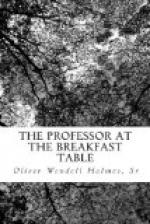I was going to leave the simple reader to wonder over this, taking it as an unexplained marvel. I think, however, I will turn over a furrow of subsoil in it.—The explanation is, of course, that in a great many thoughts there must be a few coincidences, and these instantly arrest our attention. Now we shall probably never have the least idea of the enormous number of impressions which pass through our consciousness, until in some future life we see the photographic record of our thoughts and the stereoscopic picture of our actions. There go more pieces to make up a conscious life or a living body than you think for. Why, some of you were surprised when a friend of mine told you there were fifty-eight separate pieces in a fiddle. How many “swimming glands”—solid, organized, regularly formed, rounded disks taking an active part in all your vital processes, part and parcel, each one of them, of your corporeal being—do you suppose are whirled along, like pebbles in a stream, with the blood which warms your frame and colors your cheeks?—A noted German physiologist spread out a minute drop of blood, under the microscope, in narrow streaks, and counted the globules, and then made a calculation. The counting by the micrometer took him a week.—You have, my full-grown friend, of these little couriers in crimson or scarlet livery, running on your vital errands day and night as long as you live, sixty-five billions, five hundred and seventy thousand millions. Errors excepted.—Did I hear some gentleman say, “Doubted? “—I am the Professor. I sit in my chair with a petard under it that will blow me through the skylight of my lecture-room, if I do not know what I am talking about and whom I am quoting.
Now, my dear friends, who are putting your hands to your foreheads, and saying to yourselves that you feel a little confused, as if you had been waltzing until things began to whirl slightly round you, is it possible that you do not clearly apprehend the exact connection of all that I have been saying, and its bearing on what is now to come? Listen, then. The number of these living elements in our bodies illustrates the incalculable multitude of our thoughts; the number of our thoughts accounts for those frequent coincidences spoken of; these coincidences in the world of thought illustrate those which we constantly observe in the world of outward events, of which the presence of the young girl now at our table, and proving to be the daughter of an old acquaintance some of us may remember, is the special example which led me through this labyrinth of reflections, and finally lands me at the commencement of this young girl’s story, which, as I said, I have found the time and felt the interest to learn something of, and which I think I can tell without wronging the unconscious subject of my brief delineation. Iris.




